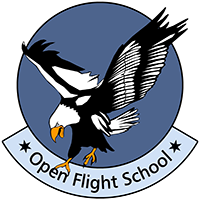Structure of Our Courses
The OFS as an open flight school provides English and German-language teaching material for various flight simulations, divided into topic-specific e-learning courses.
Arrangement of the course list is usually done according to the following scheme:
1. Content distribution:
OFS Courses
-
Organizational, basic information, general information about the website and the flight school itself.
Theory Courses
It simply doesn't work without it, the theory documents are aircraft and game independent.
- One Basic Theory Course teaches the most important basics of general theory for prospective pilots.
- The Advanced Theory Course and special courses deepen theoretical knowledge and form the basis for a sound practical training of prospective and advanced pilots.
- Theory for the Professional-Line is a complete course, very close to the real flight training, and is aimed at players with ambitions for professional sim flying. Reference books are the basis of much of the contents for the Professional Line courses.
Practical Courses (For Self-study and / or Group Learning)
Sorted by game / simulation you will find here the actual training courses for a specific aircraft. A distinction is made between difficulty by a logical order in the training.
- Taster Courses provide the first introduction and overview to a specific simulation software with the free aircraft. Starting, landing, trying out and having fun is the main aim.
- Basic Courses make it possible to get a certain aircraft into the air quickly and safely in a certain simulation according to the conventional rules. In addition to an introduction to the aircraft, the focus is on the most necessary settings and functions to start the engines, fly a circuit and land safely.
- Advanced Courses make the pilot fly the respective aircraft according to the correct parameters such as engine power, climb rate, temperatures, etc. and adhere to the applicable aviation rules. Here the pilot learns the almost complete handling of the technology available in the aircraft and gathers flying experience through flying lessons each with a certain focus. For each aircraft there may be more, or less, advanced courses on different topics and areas of focus.
- Weapon Courses teach combat aircraft and helicopters how to handle their weapons. Depending on the scope and complexity, there may also be many courses, some of which require the completion of specific advanced courses.
Expert and Special Courses the Professional-Line
2. Level of Difficulty:
The Basic Courses, and also the Taster Courses, are all classified as Basic-Line. They are aimed at prospective pilots who are looking for an overview of the aircraft system and want to gain initial experience. The aim of these courses is to enable a safe and standard startup using all necessary systems in the cockpit, the starting of the engines and a successful take-off as well as circuit and safe landing. They form the basis for fun and the further development of the pilot. There are no initial requirements here, but the pilot should at least know the essential basics from theory curses.
The Advanced-Line exists as an intermediate level between the Basic-Line and the Professional-Line. The majority of the Advanced Courses and the Weapon Courses are aimed at pilots who want more than just flying and pulling turns. They form the basis of having fun and joy in the multiplayer mode of the respective game and to develop flying skills further. In these courses use of the respective airplane is developed step by step. For example, passenger planes go into scheduled service and fighter planes into the training course on the use of weapons. In any case, there is a lot to learn to use the systems properly. Both course sections (Basic and Weapons) complement each other and can be done in parallel or consecutively and in any order.
The Expert courses of the Professional-Line are about fine detail and background knowledge for special applications such as air combat, air refuelling and tactics, usually according to the military's operational regulations, to encourage optimum use of aircraft technology. Civil aircraft, on the other hand, are used according to real checklists and real aviation procedures with corresponding calculations for fuel, take-off and landing distances, flight time, etc. English aeronautical radio and extensive flight planning are obligatory for both military and civil flights in most cases. The lessons themselves are held in English and German.
Each course also requires a certain amount of general theoretical knowledge, at first not much, but in the higher courses ,rather more. The Theory-Basic-Cours and Advanced Courses consist only of general theory independent of aircraft type. Armed with the necessary background knowledge, the practical courses will come easier.
The necessary theory part specific to the aircraft in question is always integrated into the respective course, so that practical lessons and theory sections alternate.
Every one of our courses should impart knowledge, be fun and enjoyable and not end in frustration. The speed of learning is therefore determined by each individual. The website supports independent learning. Many practical exercises can also be carried out alone in single player mode. For most courses it is obligatory to practice certain processes and procedures together at least once in multiplayer mode and, if necessary, to prove your ability in order to obtain a recognised course qualification.
